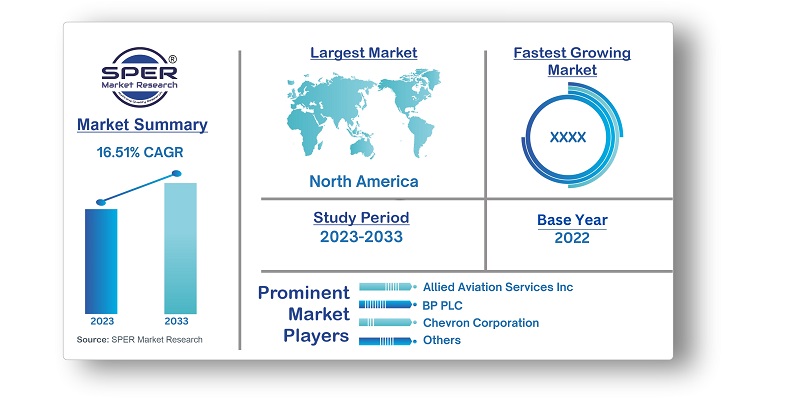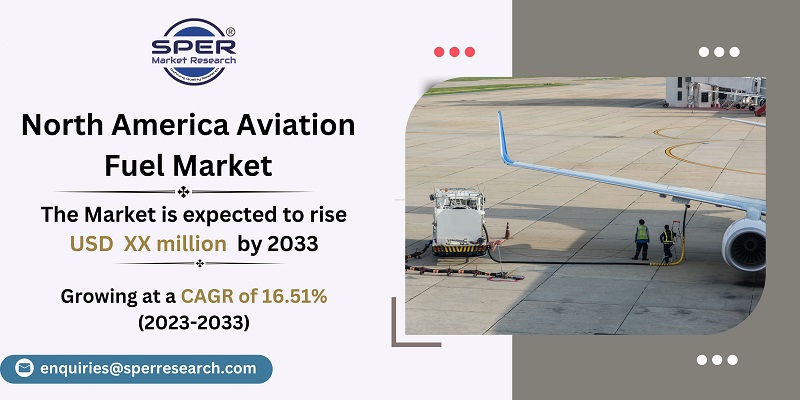
North America Aviation Fuel Market Growth, Size, Trends, Revenue, Opportunities and Future Outlook
North America Aviation Fuel Market Size- By Fuel Type, By Application - Regional Outlook, Competitive Strategies and Segment Forecast to 2033
| Published: Feb-2024 | Report ID: AERO2410 | Pages: 1 - 156 | Formats*: |
| Category : Aerospace and Defence | |||
- United Airlines signed an international purchase agreement for sustainable aviation fuel (SAF) in May 2022, making it the first airline in the US to do so. United Airlines and Neste have inked a new purchase deal that gives United the option to acquire up to 52.5 million gallons over the course of the next three years.
- In September 2022, the U.S. Department of Energy released a plan outlining a government-wide approach to increase the production and utilization of sustainable aviation fuels (SAF).


| Report Metric | Details |
| Market size available for years | 2020-2033 |
| Base year considered | 2023 |
| Forecast period | 2024-2033 |
| Segments covered | By Fuel Type, By Application |
| Regions covered | United States, Canada, Rest of North America |
| Companies Covered | Allied Aviation Services Inc, BP PLC, Chevron Corporation, Exxon Mobil Corporation, Honeywell International Inc, Pan American Energy S.L., Shell PLC, TotalEnergies SE, Valero Marketing and Supply, and others. |
- Airlines
- Aviation Fuel Suppliers
- Government Regulatory Agencies
- Investors and Financial Institutions
- Environmental Organizations
- Research Institutions and Academia
- Aircraft Manufacturers
| By Fuel Type: |
|
| By Application: |
|
| By Region: |
|
- North America Aviation Fuel Market Size (FY'2024-FY'2033)
- Overview of North America Aviation Fuel Market
- Segmentation of North America Aviation Fuel Market By Fuel Type (Air Turbine Fuel, Aviation Biofuel, AVGAS)
- Segmentation of North America Aviation Fuel Market By Application (Commercial, Defence, General Aviation)
- Expansion Analysis of North America Aviation Fuel Market
- Problems and Obstacles in North America Aviation Fuel Market
- Competitive Landscape in the North America Aviation Fuel Market
- Impact of COVID-19 and Demonetization on North America Aviation Fuel Market
- Details on Current Investment in North America Aviation Fuel Market
- Competitive Analysis of North America Aviation Fuel Market
- Prominent Players in the North America Aviation Fuel Market
- SWOT Analysis of North America Aviation Fuel Market
- North America Aviation Fuel Market Future Outlook and Projections (FY'2024-FY'2033)
- Recommendations from Analyst
1.1. Scope of the report1.2. Market segment analysis
2.1. Research data source2.1.1. Secondary Data2.1.2. Primary Data2.1.3. SPER’s internal database2.1.4. Premium insight from KOL’s2.2. Market size estimation2.2.1. Top-down and Bottom-up approach2.3. Data triangulation
4.1. Driver, Restraint, Opportunity and Challenges analysis4.1.1. Drivers4.1.2. Restraints4.1.3. Opportunities4.1.4. Challenges
4.2. COVID-19 Impacts of the North America Aviation Fuel Market
5.1. SWOT Analysis5.1.1. Strengths5.1.2. Weaknesses5.1.3. Opportunities5.1.4. Threats5.2. PESTEL Analysis5.2.1. Political Landscape5.2.2. Economic Landscape5.2.3. Social Landscape5.2.4. Technological Landscape5.2.5. Environmental Landscape5.2.6. Legal Landscape5.3. PORTER’s Five Forces5.3.1. Bargaining power of suppliers5.3.2. Bargaining power of buyers5.3.3. Threat of Substitute5.3.4. Threat of new entrant5.3.5. Competitive rivalry5.4. Heat Map Analysis
6.1. North America Aviation Fuel Market Manufacturing Base Distribution, Sales Area, Product Type6.2. Mergers & Acquisitions, Partnerships, Product Launch, and Collaboration in North America Aviation Fuel Market
7.1. North America Aviation Fuel Market Value Share and Forecast, By Fuel Type, 2024-20337.2. Air Turbine Fuel7.3. Aviation Biofuel7.4. AVGAS
8.1. North America Aviation Fuel Market Value Share and Forecast, By Application, 2024-20338.2. Commercial8.3. Defence8.4. General Aviation
9.1. North America Aviation Fuel Market Size and Market Share
10.1. North America Aviation Fuel Market Size and Market Share By Fuel Type (2020-2026)10.2. North America Aviation Fuel Market Size and Market Share By Fuel Type (2027-2033)
11.1. North America Aviation Fuel Market Size and Market Share By Application (2020-2026)11.2. North America Aviation Fuel Market Size and Market Share By Application (2027-2033)
12.1. North America Aviation Fuel Market Size and Market Share By Region (2020-2026)12.2. North America Aviation Fuel Market Size and Market Share By Region (2027-2033)12.3. United States12.4. Canada12.5. Rest of North America
13.1. Allied Aviation Services Inc13.1.1. Company details13.1.2. Financial outlook13.1.3. Product summary13.1.4. Recent developments13.2. BP PLC13.2.1. Company details13.2.2. Financial outlook13.2.3. Product summary13.2.4. Recent developments13.3. Chevron Corporation13.3.1. Company details13.3.2. Financial outlook13.3.3. Product summary13.3.4. Recent developments13.4. Exxon Mobil Corporation13.4.1. Company details13.4.2. Financial outlook13.4.3. Product summary13.4.4. Recent developments13.5. Honeywell International Inc13.5.1. Company details13.5.2. Financial outlook13.5.3. Product summary13.5.4. Recent developments13.6. Pan American Energy S.L.13.6.1. Company details13.6.2. Financial outlook13.6.3. Product summary13.6.4. Recent developments13.7. Shell PLC13.7.1. Company details13.7.2. Financial outlook13.7.3. Product summary13.7.4. Recent developments13.8. TotalEnergies SE13.8.1. Company details13.8.2. Financial outlook13.8.3. Product summary13.8.4. Recent developments13.9. Valero Marketing and Supply13.9.1. Company details13.9.2. Financial outlook13.9.3. Product summary13.9.4. Recent developments13.10. Others
SPER Market Research’s methodology uses great emphasis on primary research to ensure that the market intelligence insights are up to date, reliable and accurate. Primary interviews are done with players involved in each phase of a supply chain to analyze the market forecasting. The secondary research method is used to help you fully understand how the future markets and the spending patterns look likes.
The report is based on in-depth qualitative and quantitative analysis of the Product Market. The quantitative analysis involves the application of various projection and sampling techniques. The qualitative analysis involves primary interviews, surveys, and vendor briefings. The data gathered as a result of these processes are validated through experts opinion. Our research methodology entails an ideal mixture of primary and secondary initiatives.



Frequently Asked Questions About This Report
PLACE AN ORDER
Year End Discount
Sample Report
Pre-Purchase Inquiry
NEED CUSTOMIZATION?
Request CustomizationCALL OR EMAIL US
100% Secure Payment






Related Reports
Our Global Clients
Our data-driven insights have influenced the strategy of 200+ reputed companies across the globe.




















